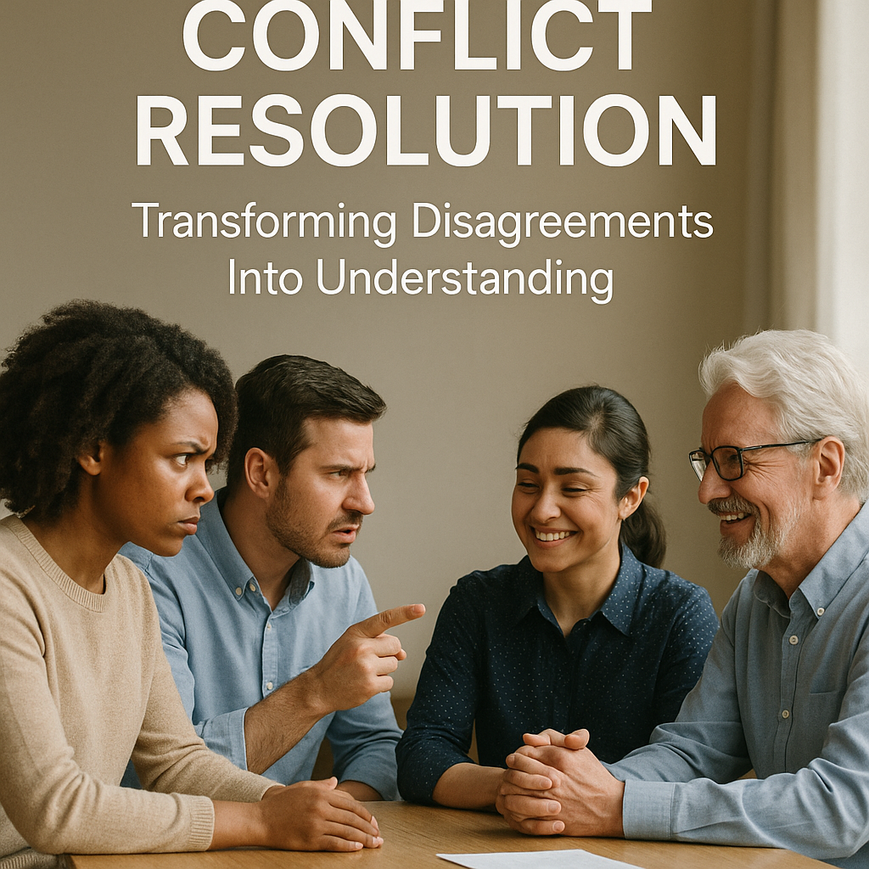
Conflict Resolution: Transforming Disagreements Into Understanding
Understanding the Roots of Conflict
Conflict often arises from a combination of factors, with misunderstandings, differing values, and poor communication being among the most common causes. According to research, conflicts can stem from discrepancies in individual values and beliefs, which shape how we interpret actions and intentions. Psychological theories suggest that our experiences, cultural backgrounds, and personal biases heavily influence our perceptions of others, potentially leading to disagreements over seemingly trivial issues.
Moreover, perceptions play a crucial role in conflict dynamics. When individuals view situations through their own subjective lenses, it can result in vastly different interpretations of the same event. For instance, a study published in the Journal of Personality and Social Psychology found that people often interpret ambiguous behaviors in a manner that aligns with their existing beliefs and experiences. This tendency reinforces existing biases and can escalate disputes unnecessarily.
Additionally, communication breakdowns are pivotal in many conflicts. Research shows that miscommunication can lead to unresolved issues, as parties may not fully grasp each other’s perspectives. By understanding these underlying causes and the role of individual perception in shaping our responses, we can better navigate disagreements and foster more constructive resolutions.
Effective Communication: The Key to Resolution
Effective communication hinges on two core techniques: active listening and clear expression.
Active Listening is a skill essential for bridging divides and promoting understanding. It involves fully concentrating, understanding, responding, and remembering what is being said. Techniques include summarizing what you’ve heard, asking clarifying questions, and being mindful of non-verbal cues. Such practices not only demonstrate respect but also validate the speaker’s feelings, essential for conflict resolution. Research shows that active listening can decrease misunderstandings and enhance relationships, promoting a more harmonious dialogue in both personal and professional settings [Source: TED].
Clear Expression complements active listening by ensuring that your thoughts and feelings are conveyed effectively. Techniques for clarity include using “I” statements to express feelings without placing blame, maintaining an open and non-threatening tone, and organizing your thoughts before speaking. Clarity can significantly reduce confusion and prevent your message from being misinterpreted. Studies suggest that clear and concise communication leads to higher satisfaction in interpersonal exchanges [Source: Harvard Business Review].
Integrating both active listening and clear expression into your interactions fosters an environment of respect and understanding, ultimately paving the way for effective resolutions and stronger relationships.
Strategies to Manage and Resolve Conflicts
To maintain peace and harmony in a long-term relationship, it’s essential to implement proactive habits and strategies that foster mutual respect and prevent future conflicts. Here are some effective approaches:
- Enhanced Communication: Prioritize open and honest dialogue. Encourage each other to share feelings and concerns regularly, which helps in addressing potential misunderstandings before they escalate. Using techniques from deep listening can significantly improve communication quality.
- Regular Check-Ins: Schedule time for regular relationship check-ins to discuss what’s working and what might need adjustment. This proactive approach can catch issues early and reinforces a team mentality in resolving them.
- Set Healthy Boundaries: Clearly define and respect each other’s boundaries. This creates a sense of safety and trust, allowing both partners to express their needs without fear of overstepping or conflict. For more on this, refer to Setting Healthy Boundaries.
- Practice Empathy: Strive to understand your partner’s perspective, particularly during disagreements. This fosters a culture of empathy, where both partners feel valued and understood, reducing the likelihood of conflict.
- Cultivate Patience and Forgiveness: Recognize that no one is perfect; mistakes happen. Cultivating patience and the willingness to forgive is crucial for a harmonious relationship. Establishing this mindset can help both partners move past resentments more easily.
- Engagement in Shared Activities: Participate in activities that both partners enjoy. This not only strengthens the bond but also helps create positive experiences that can overshadow conflicts.
- Mindfulness Practices: Integrate mindfulness techniques into daily routines, as they have been shown to enhance relationship satisfaction. These can include meditation or simply moments of reflection between conversations, leading to greater emotional clarity.
Implementing these strategies helps nurture ongoing mutual respect and fosters a more resilient bond, essential for any long-term relationship. For deeper insights into finding peace and clarity, check out our Mindfulness Techniques guide.
Turning Arguments into Opportunities for Growth
Disagreements can be transformed into opportunities for personal and relational growth. By viewing conflicts as chances to understand different perspectives, couples can bridge gaps in their understanding and deepen their connection. One effective way to achieve this is through collaborative problem-solving, which focuses on finding solutions that satisfy both parties involved. This approach typically shifts the focus from blame to finding common ground, leading to more constructive outcomes.
Moreover, research supports the idea that resolving disagreements can improve overall relationship dynamics. Evidence shows that couples who engage in healthy discussions of disagreements often report higher relationship satisfaction and emotional intimacy. Thus, it’s essential to cultivate an attitude of curiosity instead of criticism during conflicts, which opens avenues for mutual respect and deeper understanding.
Maintaining Peace: Tips for Long-Term Relationship Harmony
Implementing the strategies previously discussed can aid in nurturing ongoing mutual respect, but maintaining peace in relationships requires constant effort. Here are some additional tips:
- Prioritize Quality Time: Schedule regular engaging activities with your partner to strengthen your bond and create shared memories.
- Express Gratitude: Regularly acknowledging and showing appreciation for each other’s contributions fosters a positive atmosphere.
- Stay Committed to Self-Improvement: Personal growth contributes to relationship health. Engage in activities that individually enhance your emotional and psychological well-being.
By incorporating these practices, partners can build a resilient relationship that can weather the storms of conflict and remain steadfast over time.
Sources
- Journal of Personality and Social Psychology – Interpretations of Ambiguous Behaviors
- Frontiers in Psychology – Miscommunication and Unresolved Issues
- Harvard Business Review – The Art of Communicating
- NCBI – Discrepancies in Individual Values and Beliefs
- Setting Healthy Boundaries – A Complete Guide
- Deep Listening – Transform Your Relationships
- Mindfulness Techniques – A Comprehensive Guide
- TED – The Power of Listening







